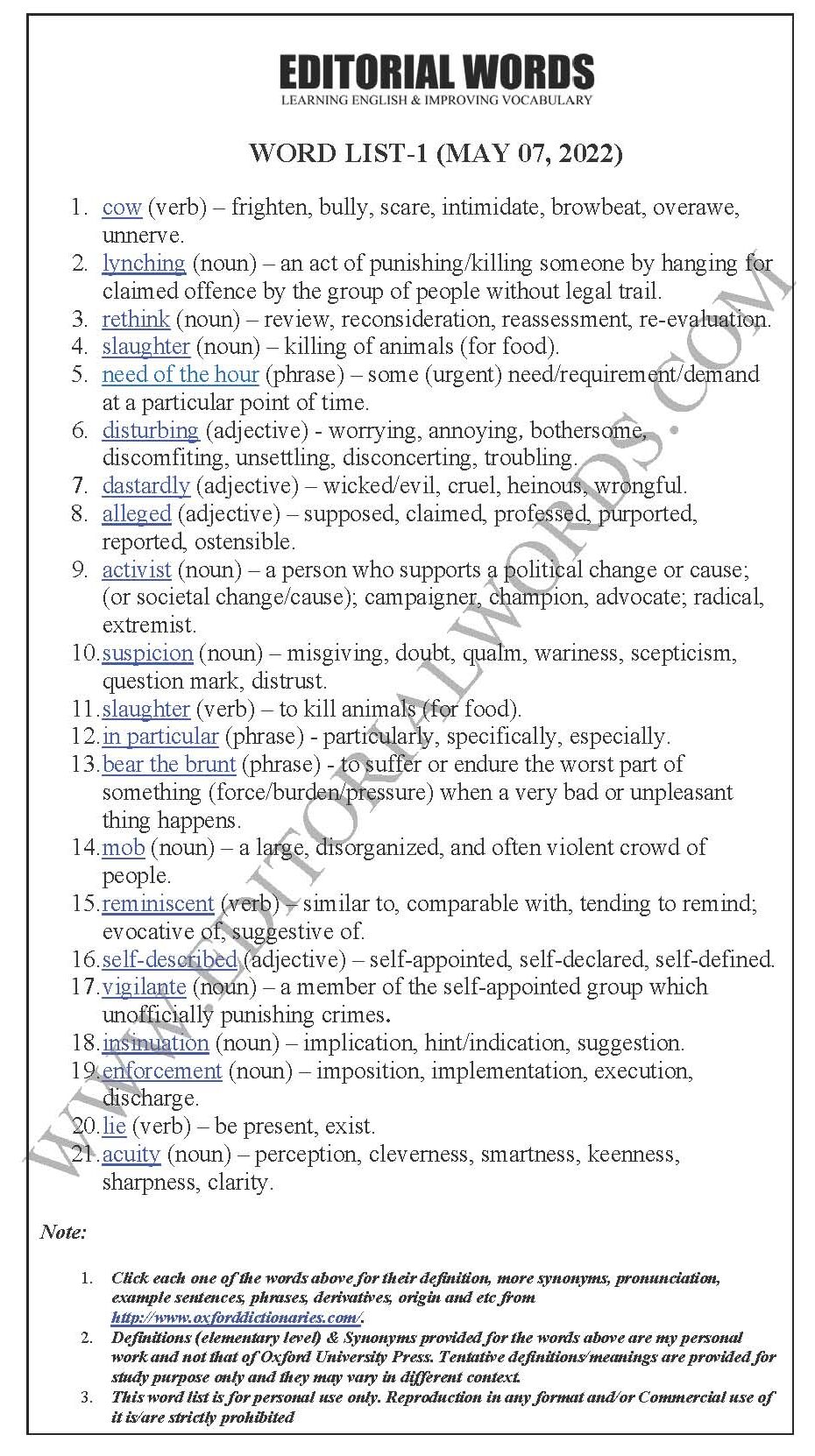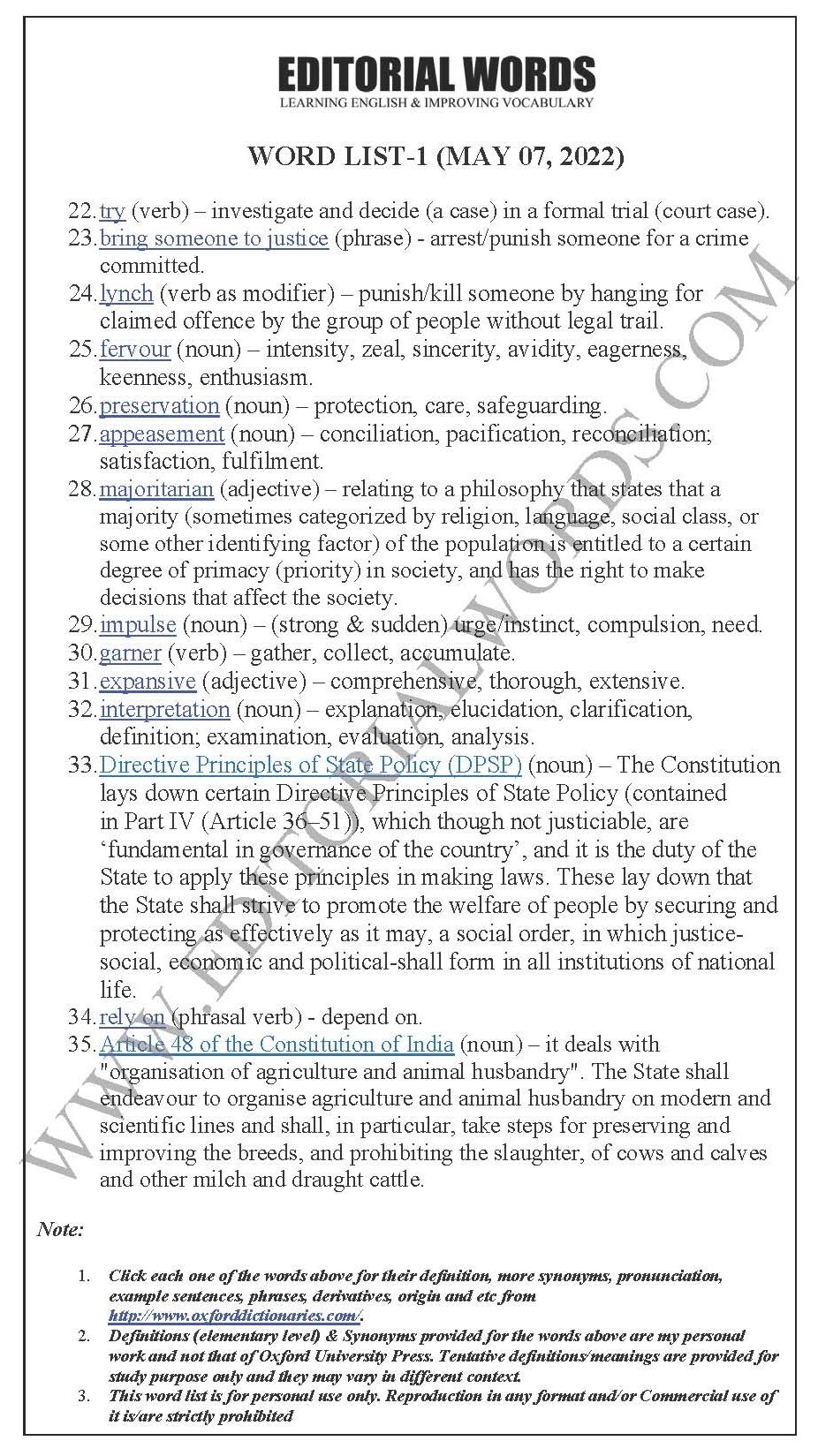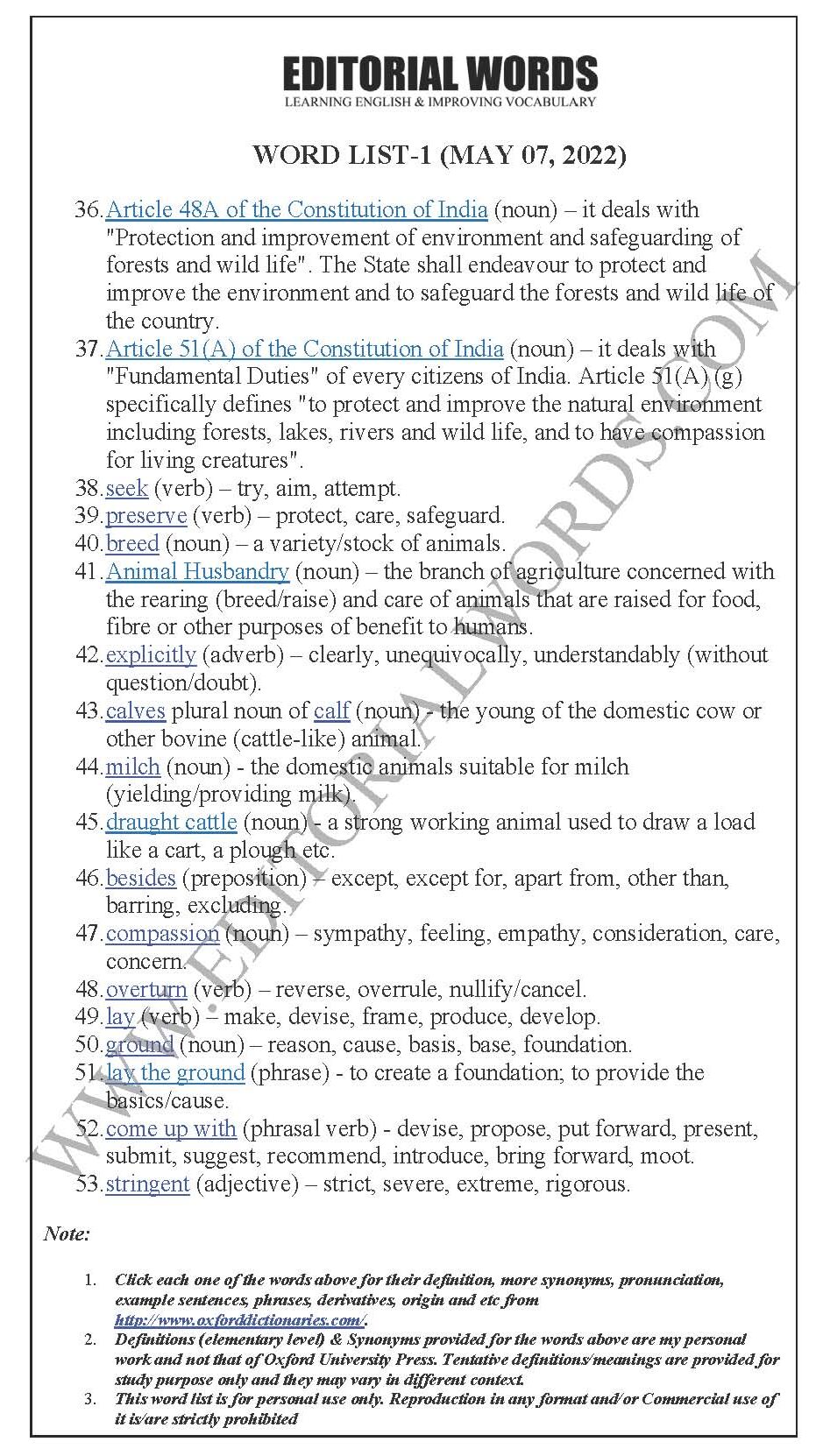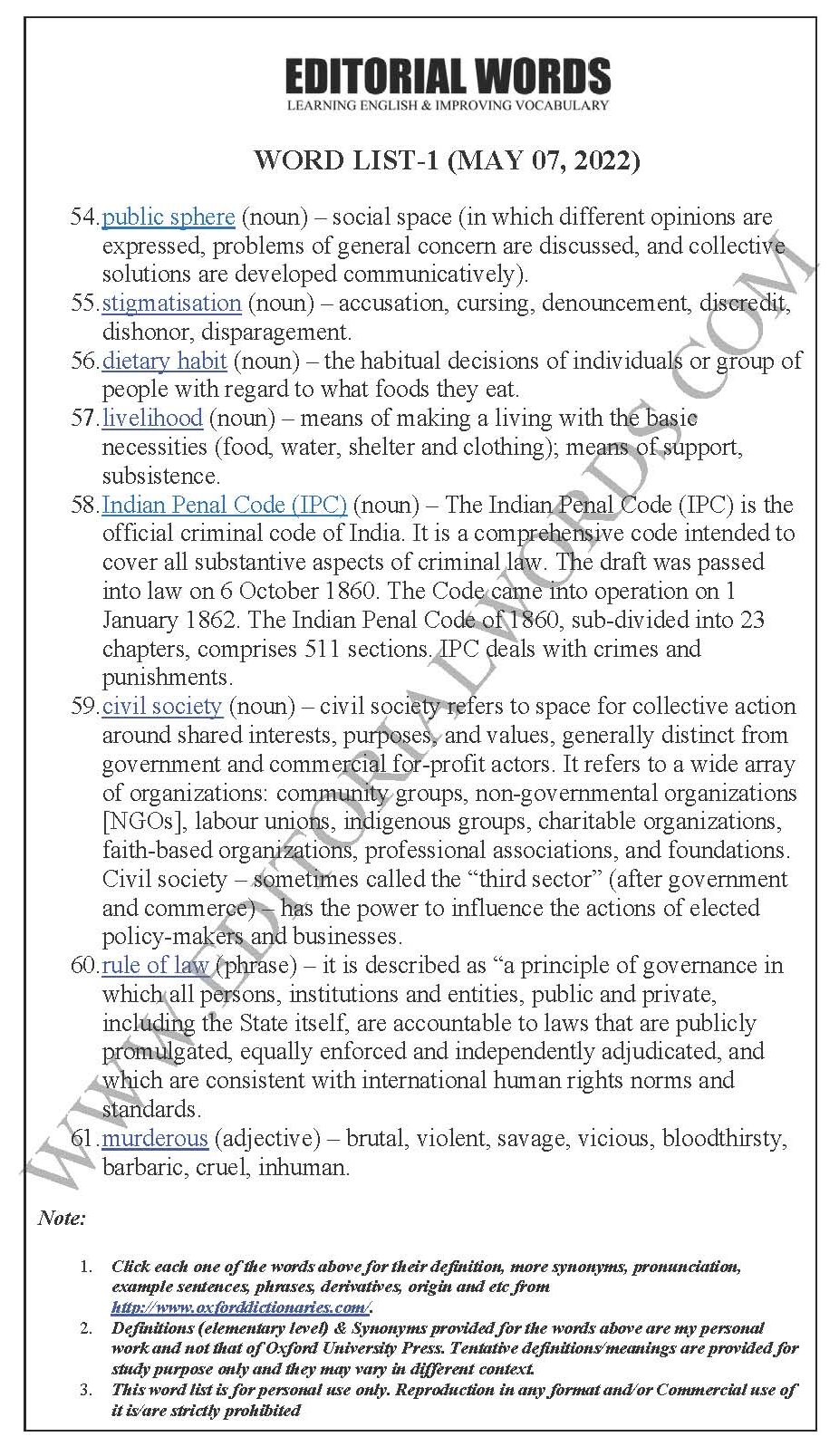The Hindu Editorial (Cowed down) – May 07, 2022
In yet another disturbing and dastardly act that is now part of a pattern in much of North India, two tribal men were beaten to death by alleged activists of the Bajrang Dal in Seoni, Madhya Pradesh, on the suspicion that they were slaughtering cows… For further reading, visit “The Hindu”. Below is today’s word list-1 for The Hindu Editorial (Cowed down) – May 07, 2022.
To read this article, click “The Hindu”.
This preview is provided here with permission.
Courtesy: The Hindu
The Hindu Editorial (Cowed down) – May 07, 2022:
- cow (verb) – frighten, bully, scare, intimidate, browbeat, overawe, unnerve.
- lynching (noun) – an act of punishing/killing someone by hanging for claimed offence by the group of people without legal trail.
- rethink (noun) – review, reconsideration, reassessment, re-evaluation.
- slaughter (noun) – killing of animals (for food).
- need of the hour (phrase) – some (urgent) need/requirement/demand at a particular point of time.
- disturbing (adjective) – worrying, annoying, bothersome, discomfiting, unsettling, disconcerting, troubling.
- dastardly (adjective) – wicked/evil, cruel, heinous, wrongful.
- alleged (adjective) – supposed, claimed, professed, purported, reported, ostensible.
- activist (noun) – a person who supports a political change or cause; (or societal change/cause); campaigner, champion, advocate; radical, extremist.
- suspicion (noun) – misgiving, doubt, qualm, wariness, scepticism, question mark, distrust.
- slaughter (verb) – to kill animals (for food).
- in particular (phrase) – particularly, specifically, especially.
- bear the brunt (phrase) – to suffer or endure the worst part of something (force/burden/pressure) when a very bad or unpleasant thing happens.
- mob (noun) – a large, disorganized, and often violent crowd of people.
- reminiscent (verb) – similar to, comparable with, tending to remind; evocative of, suggestive of.
- self-described (adjective) – self-appointed, self-declared, self-defined.
- vigilante (noun) – a member of the self-appointed group which unofficially punishing crimes.
- insinuation (noun) – implication, hint/indication, suggestion.
- enforcement (noun) – imposition, implementation, execution, discharge.
- lie (verb) – be present, exist.
- acuity (noun) – perception, cleverness, smartness, keenness, sharpness, clarity.
- try (verb) – investigate and decide (a case) in a formal trial (court case).
- bring someone to justice (phrase) – arrest/punish someone for a crime committed.
- lynch (verb as modifier) – punish/kill someone by hanging for claimed offence by the group of people without legal trail.
- fervour (noun) – intensity, zeal, sincerity, avidity, eagerness, keenness, enthusiasm.
- preservation (noun) – protection, care, safeguarding.
- appeasement (noun) – conciliation, pacification, reconciliation; satisfaction, fulfilment.
- majoritarian (adjective) – relating to a philosophy that states that a majority (sometimes categorized by religion, language, social class, or some other identifying factor) of the population is entitled to a certain degree of primacy (priority) in society, and has the right to make decisions that affect the society.
- impulse (noun) – (strong & sudden) urge/instinct, compulsion, need.
- garner (verb) – gather, collect, accumulate.
- expansive (adjective) – comprehensive, thorough, extensive.
- interpretation (noun) – explanation, elucidation, clarification, definition; examination, evaluation, analysis.
- Directive Principles of State Policy (DPSP) (noun) – The Constitution lays down certain Directive Principles of State Policy (contained in Part IV (Article 36–51)), which though not justiciable, are ‘fundamental in governance of the country’, and it is the duty of the State to apply these principles in making laws. These lay down that the State shall strive to promote the welfare of people by securing and protecting as effectively as it may, a social order, in which justice-social, economic and political-shall form in all institutions of national life.
- rely on (phrasal verb) – depend on.
- Article 48 of the Constitution of India (noun) – it deals with “organisation of agriculture and animal husbandry”. The State shall endeavour to organise agriculture and animal husbandry on modern and scientific lines and shall, in particular, take steps for preserving and improving the breeds, and prohibiting the slaughter, of cows and calves and other milch and draught cattle.
- Article 48A of the Constitution of India (noun) – it deals with “Protection and improvement of environment and safeguarding of forests and wild life”. The State shall endeavour to protect and improve the environment and to safeguard the forests and wild life of the country.
- Article 51(A) of the Constitution of India (noun) – it deals with “Fundamental Duties” of every citizens of India. Article 51(A) (g) specifically defines “to protect and improve the natural environment including forests, lakes, rivers and wild life, and to have compassion for living creatures”.
- seek (verb) – try, aim, attempt.
- preserve (verb) – protect, care, safeguard.
- breed (noun) – a variety/stock of animals.
- Animal Husbandry (noun) – the branch of agriculture concerned with the rearing (breed/raise) and care of animals that are raised for food, fibre or other purposes of benefit to humans.
- explicitly (adverb) – clearly, unequivocally, understandably (without question/doubt).
- calves plural noun of calf (noun) – the young of the domestic cow or other bovine (cattle-like) animal.
- milch (noun) – the domestic animals suitable for milch (yielding/providing milk).
- draught cattle (noun) – a strong working animal used to draw a load like a cart, a plough etc.
- besides (preposition) – except, except for, apart from, other than, barring, excluding.
- compassion (noun) – sympathy, feeling, empathy, consideration, care, concern.
- overturn (verb) – reverse, overrule, nullify/cancel.
- lay (verb) – make, devise, frame, produce, develop.
- ground (noun) – reason, cause, basis, base, foundation.
- lay the ground (phrase) – to create a foundation; to provide the basics/cause.
- come up with (phrasal verb) – devise, propose, put forward, present, submit, suggest, recommend, introduce, bring forward, moot.
- stringent (adjective) – strict, severe, extreme, rigorous.
- public sphere (noun) – social space (in which different opinions are expressed, problems of general concern are discussed, and collective solutions are developed communicatively).
- stigmatisation (noun) – accusation, cursing, denouncement, discredit, dishonor, disparagement.
- dietary habit (noun) – the habitual decisions of individuals or group of people with regard to what foods they eat.
- livelihood (noun) – means of making a living with the basic necessities (food, water, shelter and clothing); means of support, subsistence.
- Indian Penal Code (IPC) (noun) – The Indian Penal Code (IPC) is the official criminal code of India. It is a comprehensive code intended to cover all substantive aspects of criminal law. The draft was passed into law on 6 October 1860. The Code came into operation on 1 January 1862. The Indian Penal Code of 1860, sub-divided into 23 chapters, comprises 511 sections. IPC deals with crimes and punishments.
- civil society (noun) – civil society refers to space for collective action around shared interests, purposes, and values, generally distinct from government and commercial for-profit actors. It refers to a wide array of organizations: community groups, non-governmental organizations [NGOs], labour unions, indigenous groups, charitable organizations, faith-based organizations, professional associations, and foundations. Civil society – sometimes called the “third sector” (after government and commerce) – has the power to influence the actions of elected policy-makers and businesses.
- rule of law (phrase) – it is described as “a principle of governance in which all persons, institutions and entities, public and private, including the State itself, are accountable to laws that are publicly promulgated, equally enforced and independently adjudicated, and which are consistent with international human rights norms and standards.
- murderous (adjective) – brutal, violent, savage, vicious, bloodthirsty, barbaric, cruel, inhuman.
Note:
1. Click each one of the words above for their definition, more synonyms, pronunciation, example sentences, phrases, derivatives, origin and etc from http://www.oxforddictionaries.com/.
2. Definitions (elementary level) & Synonyms provided for the words above are my personal work and not that of Oxford University Press. Tentative definitions/meanings are provided for study purpose only and they may vary in a different context.
3. This word list is for personal use only. Reproduction in any format and/or Commercial use of it is/are strictly prohibited.
The Hindu Editorial (Cowed down) – May 07, 2022:




“Phrasal Verbs” We Learnt Last Week
“Idioms & Phrases” We Learnt Last Week
“Important Definitions” We Learnt Last Week
Recent Word Lists For The Hindu Editorial Articles

Be the first to comment